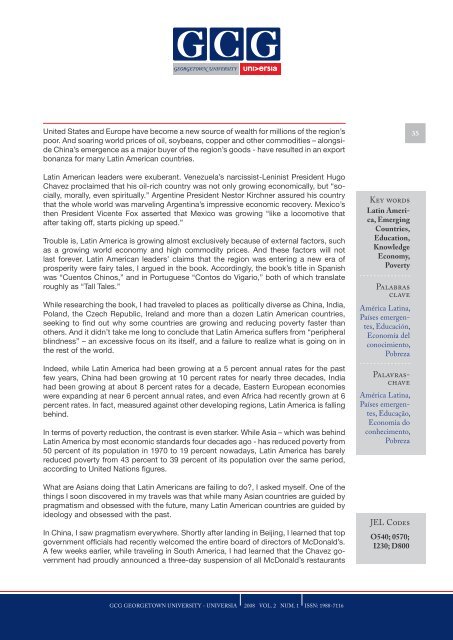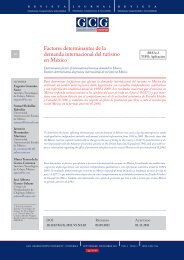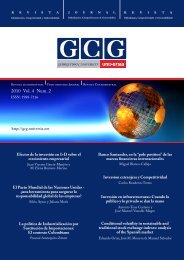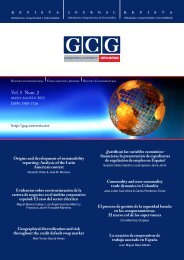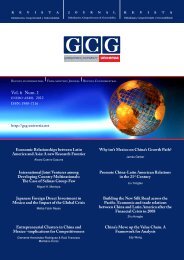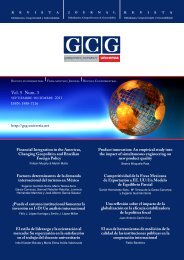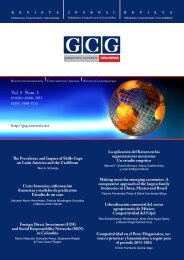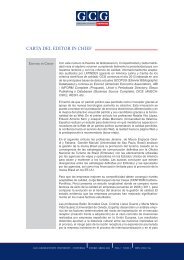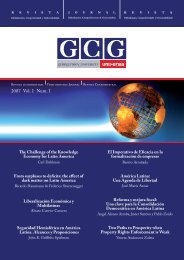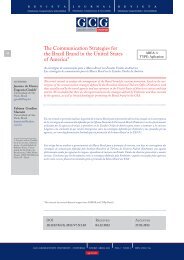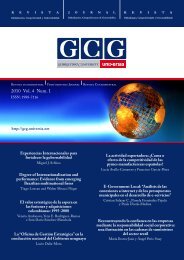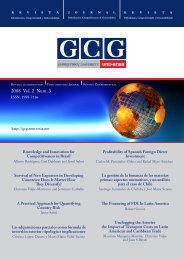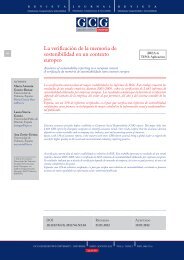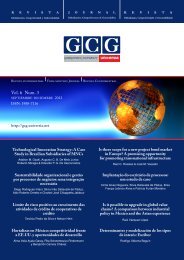2008 Vol. 2 Num. 1 - GCG: Revista de Globalización, Competitividad ...
2008 Vol. 2 Num. 1 - GCG: Revista de Globalización, Competitividad ...
2008 Vol. 2 Num. 1 - GCG: Revista de Globalización, Competitividad ...
Create successful ePaper yourself
Turn your PDF publications into a flip-book with our unique Google optimized e-Paper software.
United States and Europe have become a new source of wealth for millions of the region’spoor. And soaring world prices of oil, soybeans, copper and other commodities – alongsi<strong>de</strong>China’s emergence as a major buyer of the region’s goods - have resulted in an exportbonanza for many Latin American countries.Latin American lea<strong>de</strong>rs were exuberant. Venezuela’s narcissist-Leninist Presi<strong>de</strong>nt HugoChavez proclaimed that his oil-rich country was not only growing economically, but “socially,morally, even spiritually.” Argentine Presi<strong>de</strong>nt Nestor Kirchner assured his countrythat the whole world was marveling Argentina’s impressive economic recovery. Mexico’sthen Presi<strong>de</strong>nt Vicente Fox asserted that Mexico was growing “like a locomotive thatafter taking off, starts picking up speed.”Trouble is, Latin America is growing almost exclusively because of external factors, suchas a growing world economy and high commodity prices. And these factors will notlast forever. Latin American lea<strong>de</strong>rs’ claims that the region was entering a new era ofprosperity were fairy tales, I argued in the book. Accordingly, the book’s title in Spanishwas “Cuentos Chinos,” and in Portuguese “Contos do Vigario,” both of which translateroughly as “Tall Tales.”While researching the book, I had traveled to places as politically diverse as China, India,Poland, the Czech Republic, Ireland and more than a dozen Latin American countries,seeking to find out why some countries are growing and reducing poverty faster thanothers. And it didn’t take me long to conclu<strong>de</strong> that Latin America suffers from “peripheralblindness” – an excessive focus on its itself, and a failure to realize what is going on inthe rest of the world.In<strong>de</strong>ed, while Latin America had been growing at a 5 percent annual rates for the pastfew years, China had been growing at 10 percent rates for nearly three <strong>de</strong>ca<strong>de</strong>s, Indiahad been growing at about 8 percent rates for a <strong>de</strong>ca<strong>de</strong>, Eastern European economieswere expanding at near 6 percent annual rates, and even Africa had recently grown at 6percent rates. In fact, measured against other <strong>de</strong>veloping regions, Latin America is fallingbehind.In terms of poverty reduction, the contrast is even starker. While Asia – which was behindLatin America by most economic standards four <strong>de</strong>ca<strong>de</strong>s ago - has reduced poverty from50 percent of its population in 1970 to 19 percent nowadays, Latin America has barelyreduced poverty from 43 percent to 39 percent of its population over the same period,according to United Nations figures.What are Asians doing that Latin Americans are failing to do?, I asked myself. One of thethings I soon discovered in my travels was that while many Asian countries are gui<strong>de</strong>d bypragmatism and obsessed with the future, many Latin American countries are gui<strong>de</strong>d byi<strong>de</strong>ology and obsessed with the past.In China, I saw pragmatism everywhere. Shortly after landing in Beijing, I learned that topgovernment officials had recently welcomed the entire board of directors of McDonald’s.A few weeks earlier, while traveling in South America, I had learned that the Chavez governmenthad proudly announced a three-day suspension of all McDonald’s restaurantsKey wordsLatin America,EmergingCountries,Education,KnowledgeEconomy,PovertyPalabrasclaveAmérica Latina,Países emergentes,Educación,Economía <strong>de</strong>lconocimiento,PobrezaPalavraschaveAmérica Latina,Países emergentes,Educação,Economia doconhecimento,PobrezaJEL Co<strong>de</strong>sO540; 0570;I230; D80035<strong>GCG</strong> GEORGETOWN UNIVERSITY - UNIVERSIA <strong>2008</strong> VOL. 2 NUM. 1 ISSN: 1988-7116


